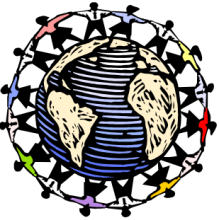Current Issues in Medical Anthropology and Global Health (MAGH) seminar series details:
-
ANTH 324/524
-
Autumn Quarter, 2022
-
Wednesdays 3:30 p.m. to 4:50 p.m.
-
Credits: 2 (CR/NC)
-
Location: Online and Synchronous
-
Course Instructor/Coordinator: Bettina Shell-Duncan (bsd@uw.edu)
Current Issues in Medical Anthropology and Global Health is a weekly seminar series featuring guest speakers designed to introduce students to current issues in the field of medical anthropology and global health, ranging from humanistic to scientific approaches in the field. It will feature presentations from “core” faculty in the Medical Anthropology and Global Health (MAGH) area of emphasis in the Department of Anthropology, MAGH professionals working in the greater Seattle area, and visiting scholars. Undergraduates in the MAGH option or possibly interested in this option are encouraged to enroll, as are anthropology graduate students with interest in our MAGH area of emphasis.
The theme for the 2022 Speaker Series is:
MEDICAL ANTHROPOLOGY AND GLOBAL HEALTH IN THE ERA OF COVID
Since the rapid onset of the COVID pandemic in 2020, it has been argued that it too should be understood as a syndemic as this disease, like previous pandemics, reflect and magnify health disparities rooted in political, economic and social conditions. While anthropologists are well prepared to conduct research on the rapidly changing constellation of interacting factors that produce vulnerability and inequalities in morbidity and mortality, they are themselves also living in the era of COVID and challenged to find way to carry out research. The speaker series this quarter will feature research by by a diverse range of scholars in the field of medical anthropology and global health, and will explore key questions, including:
- How has the COVID syndemic shaped the way that research is done?
- How has it influenced the questions that are asked?
- How has it altered the way that researchers work with and in communities?
- How has COVID interacted with other factors (sociocultural, political, economic, environmental, biological) to magnify health inequality?
- Why is a syndemic approach useful for illuminating possible solutions?
Speaker Line-Up:
- September 28 Introduction to the series
- Oct. 5 James Pfeiffer "International Debt, Austerity, and the Struggle for Universal Health Coverage after COVID: Anthropological Perspectives"
- Oct 12 Sam Dubal Memorial Lecture: Dr. Ugo Edu. “Are You Sure You Want Health Equity?”
- Oct. 19 Denise Glover “Resource Sustainability and a Traditional Adaptive Practice in Tibetan Medicine”
- Oct. 26 Marieke van Eijk “Brokering a Broken Health System: The Health Equity Work of Health Insurance Navigators.”
- Nov. 2 Rob Tennyson : “'Legs Feed the Wolf': An Evolutionary Perspective on Psychosocial Stress, Physical Activity, and their Associations with Telomere Length.”
- Nov. 9 Steve Goodreau – “COVID’s Impact on HIV Prevention and Care Services for Gay, Bi, and Other Men who have Sex with Men: A Tale of Two Cities.”
- Nov. 16 Emily Brunson, “Having a Seat at the Decision-Making Table: Using Social Science to Inform COVID-19 Policy.”
- Nov. 23 – Thanksgiving Break
- Nov 30 Raphaelle Rabannes "Health inequities, bodily sovereignty and the politics of COVID management in the French Caribbean."
- Dec 7 Kathaleeya Liamdee “Two Years of Border Closure: COVID-19 and the Disruption of transnational healthcare access. The Case of the Thai-Cambodian Border.”
